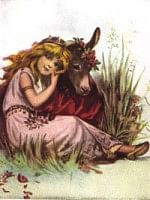Writers who borrowed from Shakespeare

Charles Dickens, Thomas Hardy, Somerset Maugham, Tom Stoppard, John Steinbeck, Aldous Huxley, William Faulkner, Pearl S. Buck, Agatha Christie and many other famous writers have used phrases from Shakespeare as titles for their works. Many writers throughout the world have been greatly influenced by the works of Shakespeare, and as a result, they have quoted him, particularly in the titles they have chosen. "I am not only witty in myself, but the cause that wit is in other men" --- Falstaff's comment is a clue to knowing that Shakespeare's wit inspired others to write and the titles derived from his works reemphasize his greatness over all other writers.
Our purpose here is to quote the great lines by Shakespeare for pleasure and add some more pleasure in showing that a phrase or two from these lines have been titles for other works by other great writers. The lines quoted here are worth reading because they are famous lines from Shakespeare. To begin with, we read the following lines from As You Like It:
"Under the green wood tree / Who loves to lie with me / And turn his merry note / Unto the sweet bird's throat."
Thomas Hardy, a poet and novelist, chose Under the Greenwood Tree as the title for one of his great novels.
Hamlet has a host of friends, some of whom turn out to be his enemies and conspire with Claudius to eliminate him. Two of his school fellows, Rosencrantz and Guildenstern, whom he compares with adders, accompany him to England with a letter from Claudius requesting that Hamlet be killed. Hamlet could foresee the conspiracy and was able to save himself and get his untrustworthy friends killed. An ambassador from England tells the audience: "The ears are senseless that should give us hearing / To tell him his commandment is fulfilled / That Rosencrantz and Guildenstern are dead."
Tom Stoppard has directly borrowed both the title and theme of his play Rosencrantz and Guildenstern Are Dead from the lines quoted above.
Twice Told Tales was used as a title by at least two major authors, Nathaniel Hawthorne and Charles Dickens. Life's exquisite definition in King John rings in the ears, "Life is as tedious as a twice told tale / Vexing the dull air of a drowsy man".
Aldous Huxley derived the title of his science fiction Brave New World from the humanistic lines uttered by Miranda to Ferdinand and his companions in The Tempest: "O, wonder! / How many goodly creatures are there here! / How beauteous mankind is ! O brave new world / That hath such people in it". It is pertinent to mention here that Huxley's novel of futurism does not portray human beings as " the paragon of animals".
The Good Earth writer Pearl S Buck named her collected works Words of Love, with inspiration from the saddest tragedy King Lear. The lines read: "And your large speeches may your deeds approve / That good effects may spring from words of love".
That "Frailty, thy name is woman" is a derisive comment uttered by Hamlet reminds us of the lines in As You Like It: "I must comfort the weaker vessel, as doublet and hose ought to show itself courageous to petticoat." By the word of God wives are referred to as weaker vessels derived from the Holy Bible. Historian Antonia Fraser, drawing her title from Shakespeare, gives a description of 17th century womanhood of England in her book, Weaker Vessel.
John Steinbeck drew the title of his novel The Winter of Our Discontent from the famous soliloquy of Richard III. The lines read: "Now is the winter of our discontent / Made glorious summer by this son of York." The novel is an exposition of the moral degeneration of American culture. The title of another novel, The Moon is Down, by Steinbeck is drawn from Macbeth's words, "The moon is down, I have not heard the clock".
Somerset Maugham drew more than one title from Shakespeare. His novel Cakes and Ale is derived from the coaxing remark by Sir Toby Belch to the gullible Malvolio in Shakespeare's Twelfth Night: "Dost thou think, because thou art virtuous / There shall be no more cakes and ale". Another of his novels, The Razor's Edge, drew its title from lines of Love's Labour's Lost. The lines are "The tongues of mocking wenches are as keen /As is the razor's edge invisible / cutting a smaller hair than may be seen / Above the sense of sense."
One of the most famous definitions of life is here is the soliloquy of Macbeth: "It is a tale / Told by an idiot, full of sound and fury / Signifying nothing." The title of William Faulkner's novel The Sound and the Fury is taken from the quote above.
A Midsummer Night's Dream is a romance and it is immortal for its great character Nick Bottom. John Updike wrote his fiction, Bottom's Dream, based on the line, "I will get Peter Quince to write a ballad of this dream; it shall be called Bottom's dream, because it hath no bottom."
Shakespeare's Antony and Cleopatra is one of the most famous love tragedies of all time. So many of its dialogues are recited for their "infinite variety', a reference to Cleopatra herself. In a scene where Antony and Cleopatra are present, the latter says, "I'll set a bourn how far to be beloved." Antony's reply is witty: "Then must thou needs find out new heaven, new earth." It was to give rise to Joyce Carol Oates' New Heaven, New Earth.
Shakespeare's impeccable Sonnet 130 is behind the title of Anthony Burgess' novel Nothing Like the Sun. Reading the lines connected to this is refreshing to us all: "My mistress's eyes are nothing like the sun / Coral is far more red than her lips' red / If snow be white, why then her breasts are dun / If hairs be wires, black wires grow on her head."
Dorothy Parker's collected poems, Not So Deep As A Well, have had their genesis in the lines which throw light on the perennial philosophic quest of how much land a man needs for his burial. To be more specific, the lines quoted here from Romeo and Juliet gives the answer, "'Tis not so deep as a well, nor so wide as a church door; but 'tis enough, 't will serve.'"
All credit goes to the fantastic lines written by Shakespeare. Major writers who have borrowed the titles of their works from Shakespeare are heavily indebted to him because they, with all their creativity, reposed more trust in Shakespeare than in themselves by not trying to devise titles of their own.
Hamlet succinctly portrays the character of his murderous uncle Claudius: "My tables --meet it is I set it down / That one may smile, and smile, and be a villain". Rex Stout draws the title of his fiction And Be a Villain, combining in it both mystery and detective.
Shakespeare can be read again and again to comprehend fully the meaning of every word. How his words or phrases can jolt one's mind is best expressed by all these titles we have been dwelling on.

 For all latest news, follow The Daily Star's Google News channel.
For all latest news, follow The Daily Star's Google News channel. 



Comments